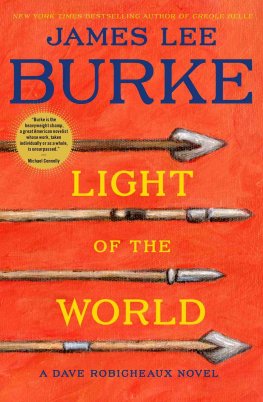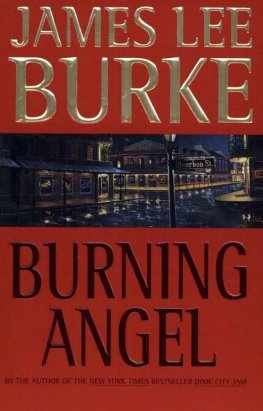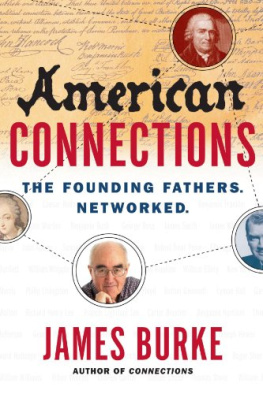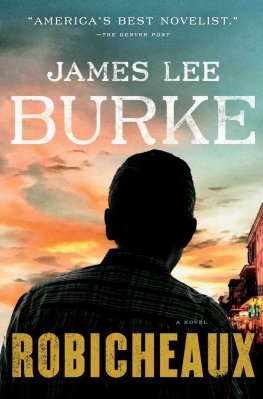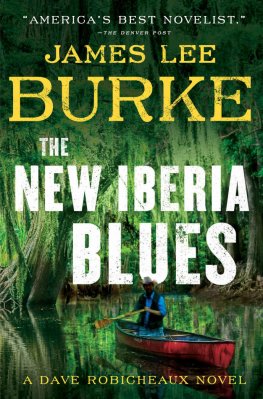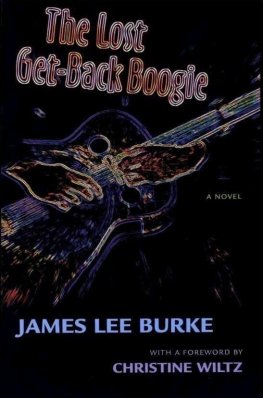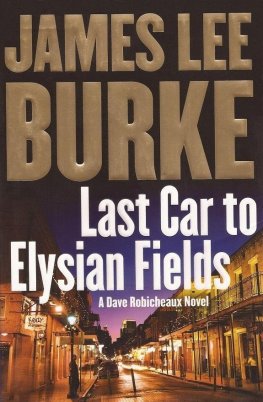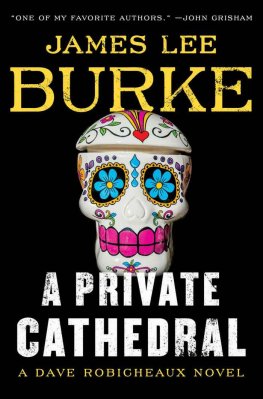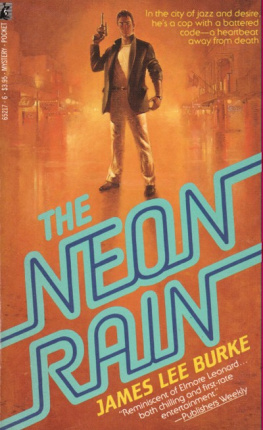James Lee Burke
Light of the World
Once again, to my wife, Pearl, and our children, James L. Burke III,
Andree Burke Walsh, Pamala Burke, and Alafair Burke
I was never good at solving mysteries. I dont mean the kind cops solve or the ones you read about in novels or watch on television or on a movie screen. Im not talking about the mystery of Creation, either, or the unseen presences that reside perhaps just the other side of the physical world. Im talking about evil, without capitalization but evil all the same, the kind whose origins sociologists and psychiatrists have trouble explaining.
Police officers keep secrets, not unlike soldiers who return from foreign battlefields with a syndrome that survivors of the Great War called the thousand-yard stare. I believe that the account of the apple taken from the forbidden tree is a metaphorical warning about looking too deeply into the darker potential of the human soul. The photographs of the inmates at Bergen-Belsen or Andersonville Prison or the bodies in the ditch at My Lai disturb us in a singular fashion because those instances of egregious human cruelty were committed for the most part by baptized Christians. At some point we close the book containing photographs of this kind and put it away and convince ourselves that the events were an aberration, the consequence of leaving soldiers too long in the field or letting a handful of misanthropes take control of a bureaucracy. It is not in our interest to extrapolate a larger meaning.
Hitler, Nero, Ted Bundy, the Bitch of Buchenwald? Their deeds are not ours.
But if these individuals are not like us, if they do not descend from the same gene pool and have the same DNA, then who were they and what turned them into monsters?
Every homicide cop lives with images he cannot rinse from his dreams; every cop who has handled investigations into child abuse has seen a side of his fellow man he never discusses with anyone, not his wife, not his colleagues, not his confessor or his bartender. There are certain burdens you do not visit on people of goodwill.
When I was in plainclothes at the NOPD, I used to deal with problems such as these in a saloon on Magazine Street, not far from the old Irish Channel. With its brass-railed bar and felt-covered bouree tables and wood-bladed fans, it became my secular church where the Louisiana of my youth, the green-gold, mossy, oak-shaded world of Bayou Teche, was only one drink away. I would start with four fingers of Jack in a thick mug, with a sweating Budweiser back, and by midnight I would be alone at the end of the bar, armed, drunk, and hunched over my glass, morally and psychologically insane.
I had come to feel loathing and disgust with the mythology that characterized the era in which I lived. I didnt serve in Southeast Asia; I survived and watched innocent people and better men than I die in large numbers while I was spared by a hand outside myself. I didnt serve and protect as a police officer; I witnessed the justice systems dysfunction and the governments empowerment of corporations and the exploitation of those who had no political voice. And while I brooded on all that was wrong in the world, I continued to stoke the furnace inside me with Black Jack and Smirnoffs and five-star Hennessy and, finally, two jiggers of Scotch inside a glass of milk at sunrise, constantly suppressing my desire to lock down on my enemies with the .45 automatic I had purchased in Saigons brothel district and with which I slept as I would a woman.
My real problem wasnt the militarization of my country or any of the other problems Ive mentioned. The real problem went back to a mystery that had beset me since the destruction of my natal home and family. My father, Big Aldous, was on the monkey board of an offshore drilling well when the drill bit punched into an early pay sand and a spark jumped off the wellhead and a mushroom of flaming oil and natural gas rose through the rigging like an inferno ballooning from the bottom of an elevator shaft. My mother, Alafair Mae Guillory, was seduced and blackmailed by a gambler and pimp named Mack, whom I hated more than any human being I ever knew, not because he turned her into a barroom whore but because of the Asian men I killed in his stead.
Rage and bloodlust and alcoholic blackouts became the only form of serenity I knew. From Saigon to the Philippines, from Chinatown in Los Angeles to the drunk tanks of New Orleans, the same questions haunted me and gave me no rest. Were some people made different in the womb, born without a conscience, intent on destroying everything that was good in the world? Or could a black wind blow the weather vane in the wrong direction for any of us and reshape our lives and turn us into people we no longer recognized? I knew there was an answer out there someplace, if I could only drink myself into the right frame of mind and find it.
I stayed ninety-proof for many years and got a bachelors degree in self-immolation and a doctorate in chemically induced psychosis. When I finally entered sobriety, I thought the veil might be lifted and I would find answers to all the Byzantine riddles that had confounded me.
That was not to be the case. Instead, a man who was one of the most wicked creatures on earth made his way into our lives. This is a tale that maybe I shouldnt share. But its not one I want to keep inside me, either.
My adopted daughter, Alafair Robicheaux, jogged up a logging road that wound through ponderosa pine and Douglas fir and cedar trees atop a ridge overlooking a two-lane highway and a swollen creek far below. The highway had been built on the exact trail that Meriwether Lewis and William Clark had followed over Lolo Pass into present-day Idaho and, eventually, to the Pacific Ocean in the year 1805. They had not been able to accomplish this feat on their own. After they and their men had sliced their moccasins to ribbons trying to make portage with their canoes through several canyons on a fork of the Columbia River, a Shoshone woman by the name of Sacagawea showed them a route that took them up a gentle slope, past the base of Lolo Peak, into the country of the Nez Perce and the spotted horses called the Appaloosa.
As Alafair jogged along the dirt road that had been graded through timber by a bulldozer, the wind blowing cool out of the trees, the western sun blazing on the fresh snow that had fallen the previous night on Lolo Peak, she wondered at the amount of history that had been changed by one brave woman, because Sacagawea not only showed the Lewis and Clark party the way to Oregon, she saved them from starvation and being slaughtered by a rogue band of Nez Perce.
Alafair was listening to a song on her iPod when she felt a stinging sensation on her left ear. She also felt a puff of air against her cheek and the touch of a feather on her skin. Without stopping, she swatted at her hair and pressed her hand against her ear and then looked at it. There was a bright smear of blood on her palm. Above, she saw two ravens glide into the boughs of a ponderosa and begin cawing at the sky.
She continued up the logging road, her breath coming hard in her throat, until she reached the top of the ridge. Then she turned and began the descent, her knees jarring on the grade, the sun moving behind Lolo Peak, the reflected light disappearing from the surface of the creek. She touched her ear again, but the cut she believed a raven had inflicted was no longer bleeding and felt like little more than a scratch. That was when she saw the aluminum shaft of a feathered arrow embedded three inches deep in a cedar snag that had been scorched and hardened in a fire.
She slowed to a stop, her heart beating hard, and looked over her shoulder. The logging road was in shadow, the border of trees so thick she could no longer feel the wind or see where the sun was. The air smelled like snow, like the coming of winter rather than summer. She took off her earbuds and listened. She heard the crackling of limbs and rocks sliding down a slope. A big doe, a mule deer, no more than twenty yards away, jumped a pile of dirt and landed squarely in the middle of the road, its gray winter coat unchanged by spring.

